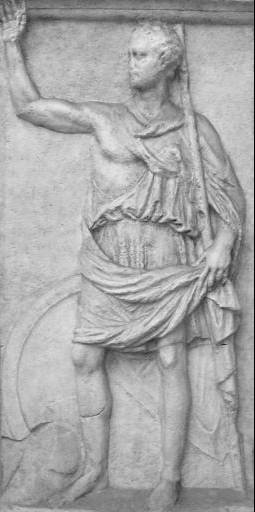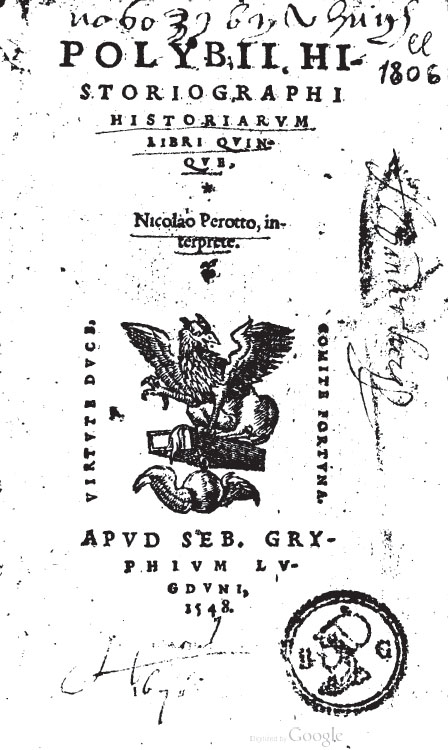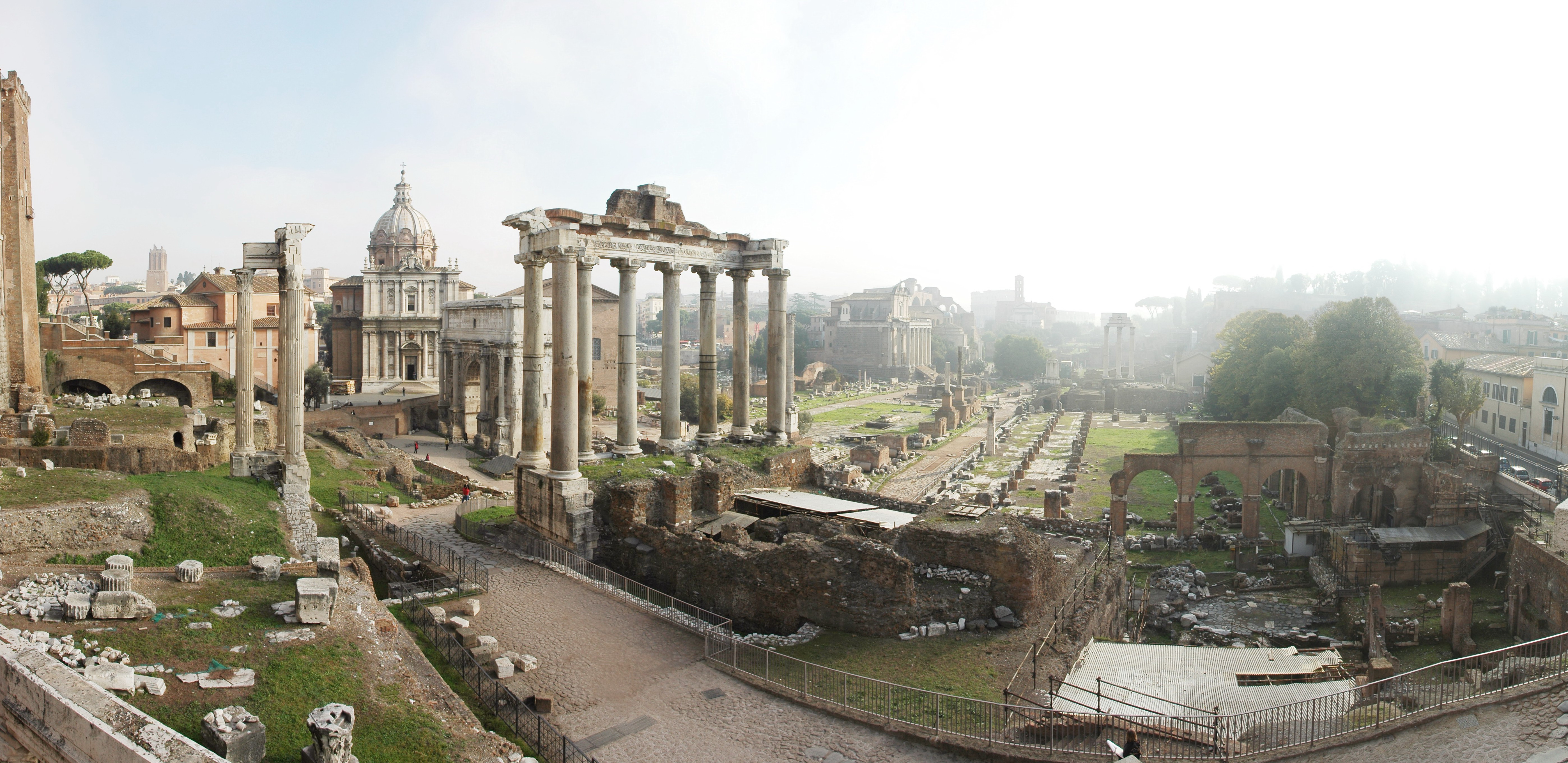Polybius
By Hannah Ibbotson
“The motivation of the victors masks the voices of the imprisoned.” These words ring true for one Greek historian named Polybius. He was one of the last members of a political group within Greece attempting to push back against the power of the Roman Republic. Though taken prisoner, he was allowed to travel with generals and attend political meetings. With this freedom, he witnessed historical events first-hand. He was granted considerably less literary freedom, though: his most famous written work, Histories, would be published under watchful Roman eyes. Polybius’s circumstances as a captive forced him to write favorably about Rome while he developed theories to explain their dominance of the Mediterranean (Eckstein, 10).

The Rise of a Historian
Polybius (c. 208-125 BCE) was a Greco-Roman philosopher born in Megalopolis, a city-state in the Achaean League, a federation of city-states within the remaining autonomous Greek land which was allied with Rome until their forced dissolution in 146 BC. At the time, the League was in a war with Antigonid Macedon, ruled by a tyrannical king. Polybius’s father, Lycortas, had attracted the attention of the Romans when he began expressing anti-Roman beliefs. Lycortas believed that the Achaean League was the last Greek power that could stop the expansion of Rome.
In 146 BC, a thousand citizens of the League, including Polybius, were taken as hostages. He was taken in by Publius Cornelius Scipio, a Roman Consul. Polybius was allowed to move around relatively freely in his captive state, leading him to learn about Roman history and travel with Scipio during the Punic Wars, which he recorded in his Histories. Though Polybius was not able to express negative views on Rome, his book was used to explain the expansion of Roman control over the Mediterranean as the Republic gained control of vast amounts of land following the conclusion of the Punic Wars.
From Greece to Rome
The Hellenistic period is often characterized as the time between Alexander the Great and the conquering of the Greek city-states by Rome. It was during this time between 220 BC and 167 BC that Rome emerged as the preeminent power in the Mediterranean. This was in stark contrast to Greece’s main rivals the Persians and the Spartans, who had tried for centuries to conquer the known world without luck. It was this power that lead Polybius to develop an explanation for Rome’s power and the reason behind their success when all others failed.

The Histories
While Polybius was a captive in Rome, he wrote his Histories, which encompassed the history of Rome from 264 to 146 BC with a primary focus on the Punic Wars along with commentary on the historical profession and methodology. He was allowed to travel with Scipio and gained first-hand experience as an eyewitness to the sacking of Carthage and numerous other battles.
The seventh book of Histories is the most historiographically important of the entire collection as it is this book that outlines Polybius’s historical methodology. His main ideas concern source analysis, universal history, cyclical theories, and factual integrity of historical writing. At the time of writing, Polybius was still a captive of Rome and some of his writings are heavily favorable towards the Romans. He utilized his experience of Roman power to justify his advocation of universal history. This type of historiographical work would not have been possible if the known world had not been unified under Roman authority.
Rome: The Champion of the Cycle
As Rome rose to the top as the main power of the Mediterranean, many thinkers tried to explain the Roman success. The concept of history as progressing through politically-dependant cycles was not a new concept by the time Polybius stepped forward with his version of the theory. Other historians had stuck with a three-part cycle, but Polybius expanded on these ideas in a six-part cycle. These cycles were social, political, and biological in which a civilization went through cycles of birth, flowering, degeneration, death, and renewal. However, Polybius’s ideas were unique as he believed each part of the period to be split into a pristine and corrupt half. He believed that every city-state experienced the same cycle, in which one government eventually becomes corrupt and is overthrown by the next. The sequence progresses through Monarchy, Tyranny, Aristocracy, Oligarchy, Democracy, and Ochlocracy (Polybius, 6.4). Then, Monarchy takes control once again, and the cycle repeats itself. Polybius did not completely explain this cycle within his Histories but instead insisted that “no clearer proof of the truth of what I say could be obtained than by a careful observation of the natural origin, genesis, and decadence of these several forms of government” (Polybius 6.4). Polybius stated that it was nearly impossible for any state to escape this cycle, though Rome was able to do it.

Many Hellenistic philosophers experimented with the idea of cyclical trends that influenced the great Mediterranean powers. With this they explained the rise and fall of empires throughout history. Yet, it was Polybius who suggested that Rome had managed to escape the cycle to become the supreme power of the time. Polybius attributed this success to two main characteristics: their political and their military achievements. He believed that by conquering other city-states in various stages of the cycle, Rome was able to find the faults and strengths inherent to each political system and adapt accordingly. But Polybius attributed most of Rome’s success to their unique form of government and constitution. He explained that the Roman Republic’s political system was a combination of monarchic, aristocratic, and democratic rule and that it was this mixed political system that saved them from the fate of the political cycle. Other philosophers had also come to this conclusion during Polybius’s lifetime; however, he believed that it was the judicial capabilities of this political system that allowed such adaptation and not the fact it was a mixture alone.
Who Gets to Write History?
In the Histories, Polybius voiced his opinion of who he believed should be writing history as well as how it should be written for posterity. He believed that those who write history should have a political education, a common idea at a time when most writings were heavily focused on warfare and intimately tied with politics. Polybius, in his reviews of other historians, would often offer criticism for a lack of political and military knowledge. Polybius also believed that history should be focused on factual details which would come from personal experience or eyewitness account.
“The soundest education and training for a life of active politics is the study of history, and that the most vivid, indeed only, teacher of how to bear the vicissitudes of fortune bravely is the recollection of other people’s calamities.” (McGing, 209)
The opinion expressed above corresponds to a rising belief at the time in the benefits of pragmatic history. A historical tale would be expressed through political and military events represented as individual deeds. This mode of writing would make sense to an audience of privileged and powerful citizens who would often end up in political office or military command.
Universal History
With Rome the master of the known world, it appeared to Polybius that it was possible to write a universal history. He wrote that “anyone who thinks that they can understand the whole of history by reading monographs on individual subjects is like the person who thinks he can appreciate the beauty and grace of a live animal from looking at the different parts of its dissected corpse” (McGing, 155). He believed that microhistories or case studies did not contribute at all to the learning of history as these did not help to explain the whole.
“It is only by the interweaving and comparison of all the parts with each other that noting their resemblances and differences, we reach a stage where we are able to do a general review and thus derive both benefit and pleasure from history.” (McGing, 156)
Throughout his Histories, Polybius expressed his dislike of monographs, or the detailed study of a single subject or event. He believed that the historian would never be able to understand the world as a whole through these means. Through universal histories, he examined political entities, events, and geography and used these to explain how events within one city-state would affect others (McGing, 156). This theory of history might have been first conceived of as the Greek city-states began declining under threat from the power of Rome as their influence spread across the Mediterranean. It was through his work of universal histories that Polybius hoped to explain how the known world was conquered by the Romans through describing the events that lead to the weakening of the city-states.
“In earlier times the world’s history had consisted, so to speak, of a series of unrelated episodes, the origins and results of each being as widely separated as their localities, but from this point [the 140th Olympiad, 220–216 BC] onwards, history becomes an organic whole: the affairs of Italy and Africa are connected with those of Asia and Greece, and all events bear a relationship and contribute to a single end.” (Eckstein, 330)
Bibliography
Eckstein, Arthur M. “Polybius, Phylarchus, and Historiographical Criticism.” Classical Philology 108, no. 4 (October 1, 2013): 314–38.
Inglis, David, and Robertson, Roland. “From Republican Virtue to Global Imaginary: Changing Visions of the Historian Polybius.” The University of Chicago Press 108, no. 4 (October 2013): 314–38.
Lemon, Michael C. Philosophy of History: A Guide for Students. Routledge, 2008.
McGing, B. C. Polybius’ Histories (Oxford Approaches to Classical Literature). Oxford University Press, 2010.
Popkin, Jeremy D. From Herodotus to H-Net : The Story of Historiography. Oxford University Press, 2015.